These letters pertain to the service record of Edward (“Ned”) Arthur Elliott (b. 1843), the son of George F. Elliott, Sr. (1810-1862) and Hannah Peters (1814-1907) of Manchester, Hartford county, Connecticut. Edward enlisted on 22 July 1861 in Co. D, 5th Connecticut Infantry when he was only 17, lying to the recruiter that he was 18. A letter from the archive of this family written to Edward by his father just weeks before his own death stated, “It will not be necessary for me to remind you that it was against my judgement and advice that you enlisted. But having done so, no honorable course remains but to persevere till we conquer a peace…You cannot harbor a thought of deserting—that would be to become a traitor to the best government that ever existed. Besides, the risk would be more than that of facing the enemy. The penalty of desertion, you know, is death. And the chances of being caught would be more than those against it. My dear boy, be true to your country and its flag, and if you have to meet hardship and danger, meet them like a man.”
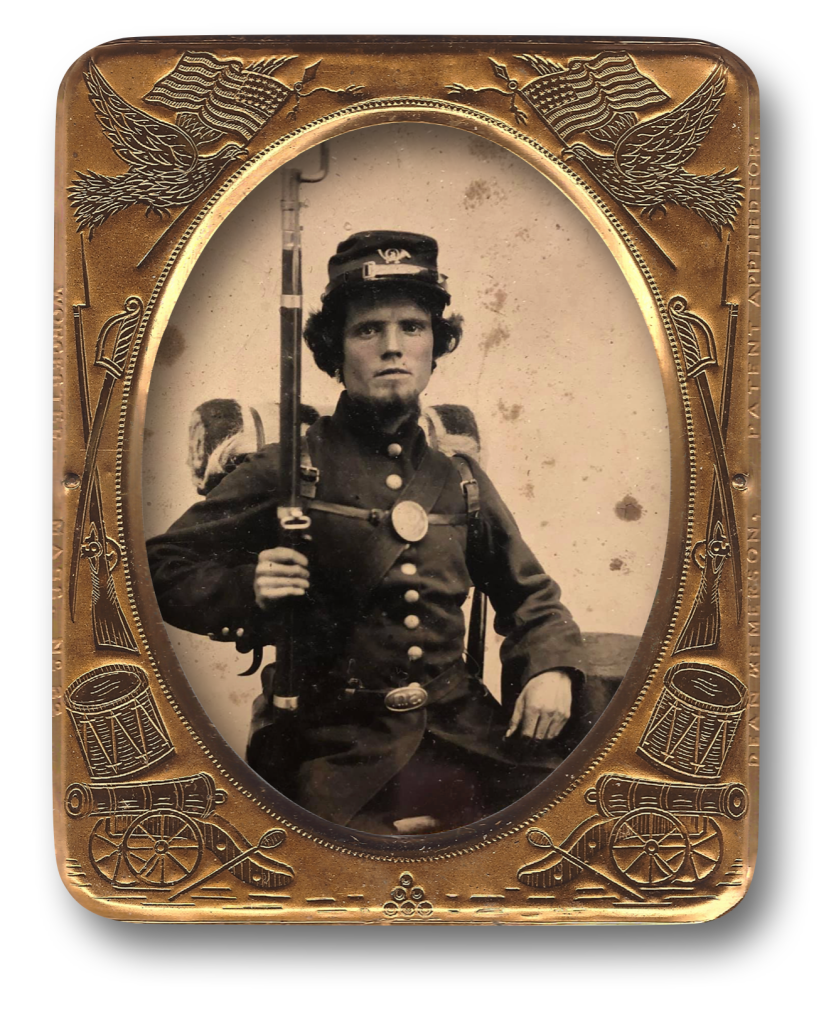
Unfortunately the records of the 5th Connecticut Infantry don’t tell us much about Edward’s service. [Note: he appears on the company roster as Edward A. Ellivett.] The only remarks next to his name read, “Deserted June 9th, 1862.” Since we can’t learn much from his military record, we have to look to his brother George’s letters to give us some indication of what became of him. In a letter that George wrote to his mother on 2 September 1862, he states: “Frank told me that he thought that Edward had deserted. So you know as much as I do about it. I think that Frank’s story is nearer the truth than what the Lieutenant wrote to Mary and all that I hope is that if he has deserted, that he has gone to sea under some good captain who will take good care of him while this war lasts.” Again, on 7 December 1862, George wrote his mother: “We shall not have Edward to pay the rent next spring and perhaps it would have been easier if we should pay part of it the next time that I get paid off by Uncle Sam.”
In Edward’s letter of 11 February 1862, he expresses his dissatisfaction with the regiment he joined and hints of his likely desertion. The fact that he did not sign his name and asked his mother to burn the letter is further evidence of his intentions. We only know for certain that the letter was written by Edward because his mother docketed the envelope and ignored her son’s instructions to burn the letter. Turns out that he fled to Canada but by 1870 he was residing with his widowed mother in Manchester, Connecticut, once again.
Edward had two older brothers who also served in the army. George Frederick Elliott (1834-1919), enlisted on 9 June 1861 in Co. A, 1st Connecticut Heavy Artillery, and James Peters Elliott (1835-1909) enlisted in Co. I of the same regiment on 10 June 1861.
George Elliott—the father—was born in London, England in 1810. In 1861, at the beginning of the Civil War, he was working as a machinist at the Colt Armory in Hartford, Connecticut. He died suddenly in January of 1862, leaving his wife to care for children at home and the anxiety attendant with having three sons fighting in the Civil War. Hannah Peters Elliott was born in Stonington, Connecticut in 1814. She died in New Britain, Connecticut in 1907.
Letter 1
[undated]
Dear folks at home,
I write to tell you that the way in which I am doctored by the these pack of fools, I should not stand it that log here. I very much wish that father would get my discharge. If he will get it, I will work my passage home and when I get home, I will show you that I have learned a lesson that I won’t soon forget. Now I pray, do get the discharge and I promise to go to work and let you have all you want.
Sister, mother or father, I only want to get home to Connecticut. I don’t care what I got to work at—only do what I ask and I will be boot black or anything else farmit [?] or anything—[even] draw chips alone and make them.
We are now about 25 miles from Washington. Nothing else in particular except that we have sometimes 2 or 3, 1 meal a day oftener. Not my [ ] when anything.
Direct to Washington to 5th Reg. Conn. Vol., care of Capt. Lane. Do what I ask for God’s sake.
[Edward]
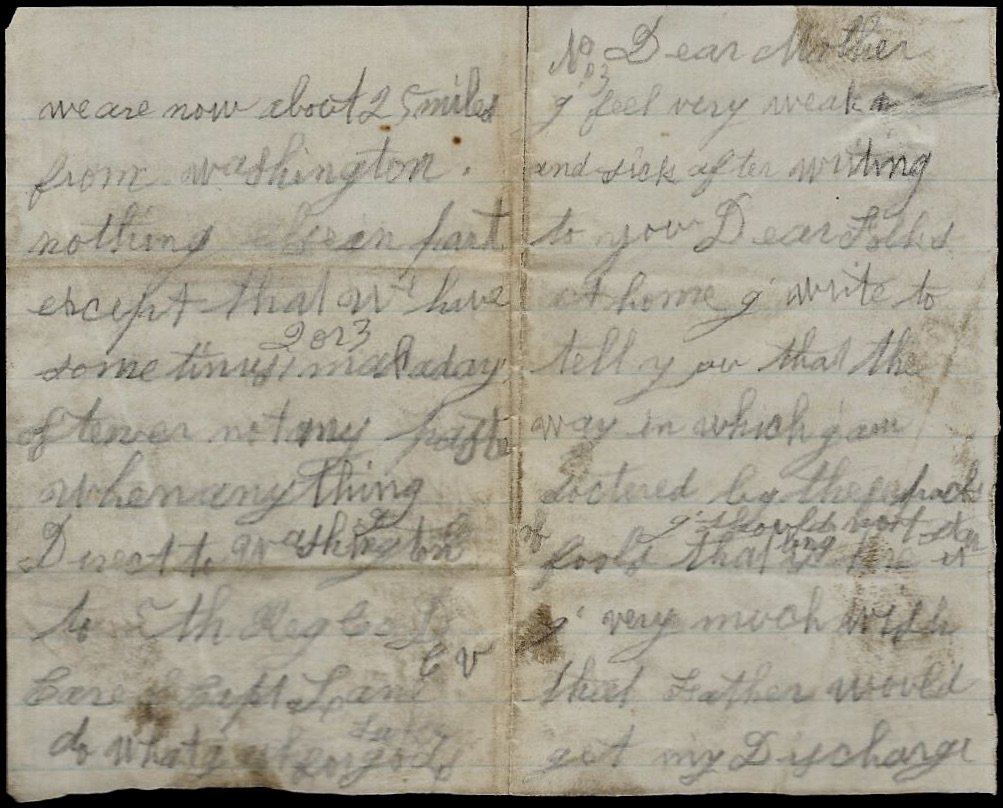

Letter 2
Hartford [Connecticut]
Sunday, September 1, 1861
My Dear Wife,
On Wednesday I received a letter from Ed telling me that he was really sick and begging me to write to the Secretary of War to grant him a discharge; but I as well as every intelligent man that I have spoken to are of opinion that amid the rush of National business, my communication would remain entirely unnoticed. I however sat down immediately and wrote to Capt. Lane requesting him to use his influence to obtain ed’s discharge and another to the Hon. Dwight Loomis to intercede at Washington. Learned that he had left Washington so I did not send it. Wrote to Ed [and] endeavored to encourage his hopes a little without elevating them too much. Told him what I had done but I had but little hope of success.
On Thursday, received one from James urging me to do what I can for Ned. Today I have written to Gov. Buckingham stating Ed’s case in as fair a light as possible and asking him to write a line to Ed’s Colonel asking for his discharge. He will be in the City tomorrow to attend the funeral of Gen. Lyon when, if I cannot get a chance for an audience, I can get my letter to him.
Poor Ned. I will do all I can for him that appears likely to be of any avail & I wrote him to that effect. On Saturday, I received an envelope from him with two billets for you and one for Euphrasia numbered 1, 2, & 3. I enclose them.
I am not certain that I shall come out before pay day. Perhaps yes, maybe no. I worked 4 nights last week till it makes me feel dumpish today. I received a letter from Charles on Thursday. He says he has not for months been earning a living [and] is much in debt and growing more so. They have lost the three months rent of their property on 3rd Avenue—$300—he says, but the wreck shall not be total unless such be the iron edict of fate. He says he cannot seem to feel the despair that would seem legitimate to such a state of affairs and jokes as much as ever. He says his wife made way with those varmints the other day not knowing that he intended to pull the wool from the eyes of men. I have written to him which makes 4 letters today and I am tired and sleepy so I’ll close.
God bless you all, — George Elliott
Be sure if you ever write to me to address me at Colts Armory. It costs one cent more but the letter carrier brings it. I will enclose an envelope.


Letter 3
Hartford [Connecticut]
September 2, 1861
Gov. Buckingham
Respected Sir,
I would do myself the honor of seeking a personal interview with you whilst you are here were it not that I conceive that you will be sufficiently bored without the addition of that. I have three sons in the Army in response to your call and that of the President of the United States. We (my wife & I) resigned them to the service of our country without a murmur. In fact, their mother (although naturally very sensitive) displayed some of that same heroism possessed by the mothers of ’76 and although to my certain knowledge she passed sleepless nights, she never let them see her shed a single tear at parting.
What I wish to solicit of you is a line to the Colonel of the 5th Regiment Con. Vols. requesting him to give a discharge and passage home to my youngest son Edward A. Elliott of Company D, 5th Regt. C. Vs.
The reason of my proffering that request to you is that he is quite sick from hemorrhage of the lungs and off duty, as I was informed from other sources besides himself, and constantly from the exposure incident to a soldiers’ life growing worse. There have been several in the family on his mother’s side who have died of that insidious disease consumption and I have no doubt from the fact of his having commenced raising blood freely and frequently that if retained, he will be of no further service where he is. If he is returned to us, it may be the means of prolonging his existence for a few years.
He is a minor—not yet 18 year of age. He left home not in accordance with my judgement, but impelled by an intense feeling of patriotism and a desire to help sustain his country and its institutions which I did not think it judicious to thwart. His ambition was beyond his physical ability and now he writes to me to endeavor to effect his release which he assures he would not ask for if he did not find himself equal to his task.
I appeal to you as the most expeditious and efficient means within my reach to effect the desired end. And knowing you to be a philanthropist, I leave the case with you relying implicitly upon your kindness, justice, and sympathy with an afflicted family. I am sorry to be under the necessity of intruding my private affairs upon your notice while I know that your time and sympathies must be pretty fully occupied by those of a public nature.
I am respectfully yours truly, — George Elliott
To his Excellency Gov. Buckingham
P. S. If you should wish to drop a single line to me informing me of your decision, it would be gratefully received in which case please address George Elliott. Colts Armory, Hartford, Ct.
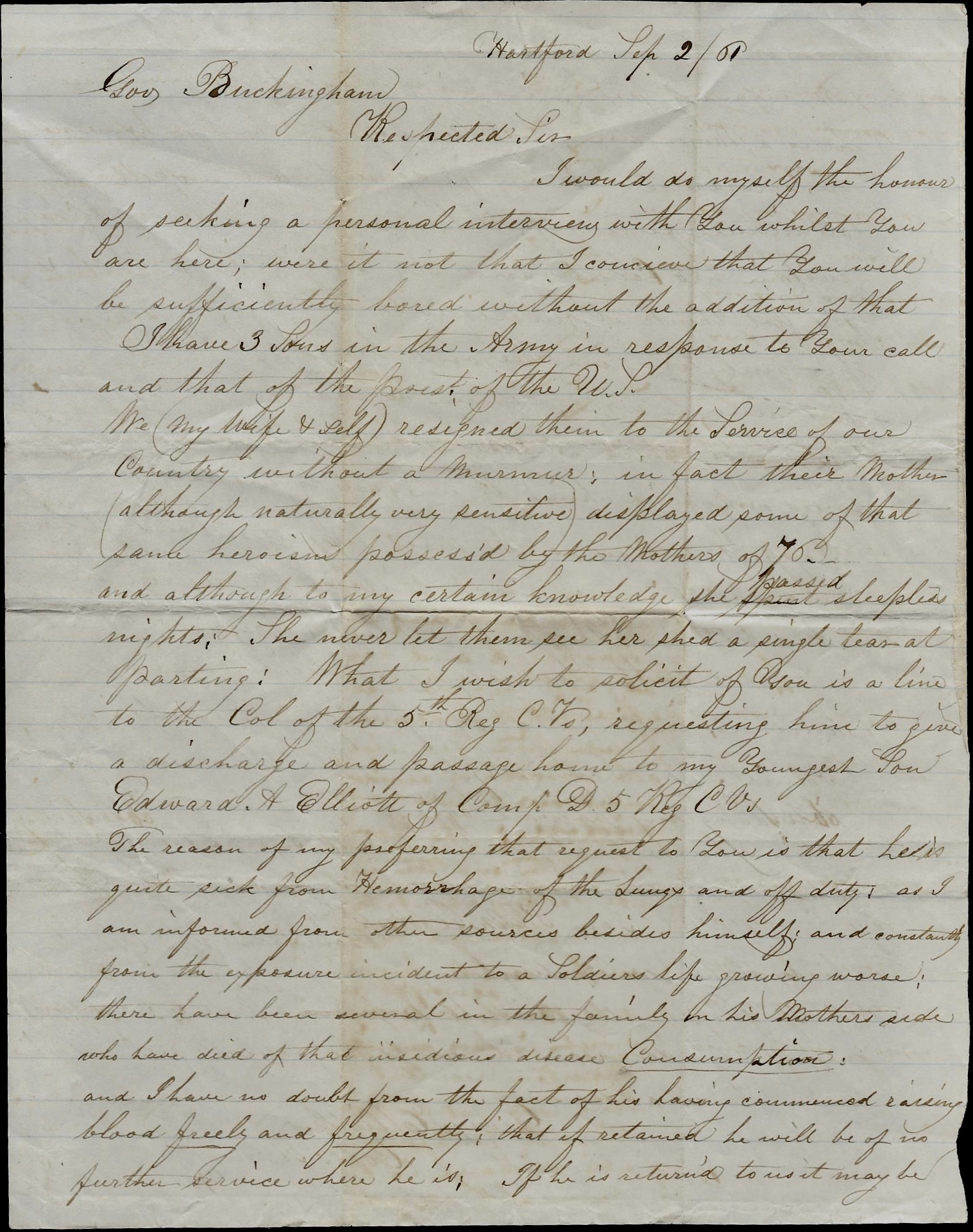

Letter 4
Hartford [Connecticut]
September 3, 1861
Dear Ned,
Since I received your letter, I have been thinking and contriving which or what would be the best plan for me to adopt to aid you in your request for a discharge and passage home. After mature deliberation and advice with persons capable of judging, I concluded, as I thought at first, it would be useless to write to the Secretary of War. He has so much national business at present on hand, he would not be in the least likely to attend to private affairs. I then tried to think what would be best for me to do. I had written to your Captain and I thought of writing to your Colonel but that idea did not strike me favorably. What then, I happened to think that Gov. Buckingham would be in the City today and if I could get him to write a line to your Colonel, it would probably produce the desired effect.
I accordingly wrote a letter to Gov. B. stating your case in as fair a light as I could and saying all I could think of to interest him in your favor, and asking him to write a line to your Colonel for your discharge and passage home. I told him that you raised blood frequently and in quantities and was still growing worse from the unavoidable exposure of a soldier’s life, that several members of the family on your mother’s side died with consumption, and that being attacked in this manner, you would not probably be any further service in the Army (and lots more).
This evening I received and answer from Gov. B. saying that he had forwarded my letter to the Surgeon of the 5th Regiment requesting him to investigate the case and if he found it to be as I stated, that you might be discharged. So if the Surgeon considers you as sick as I represented, that will probably do your business, and it will belong to them to furnish you a passage home. Be patient. Don’t say too much about what is going on to anyone and I hope to see you before long.
I received your letter for your mother and sister and forwarded them yesterday. Love from all. Your affectionate father, — George Elliott

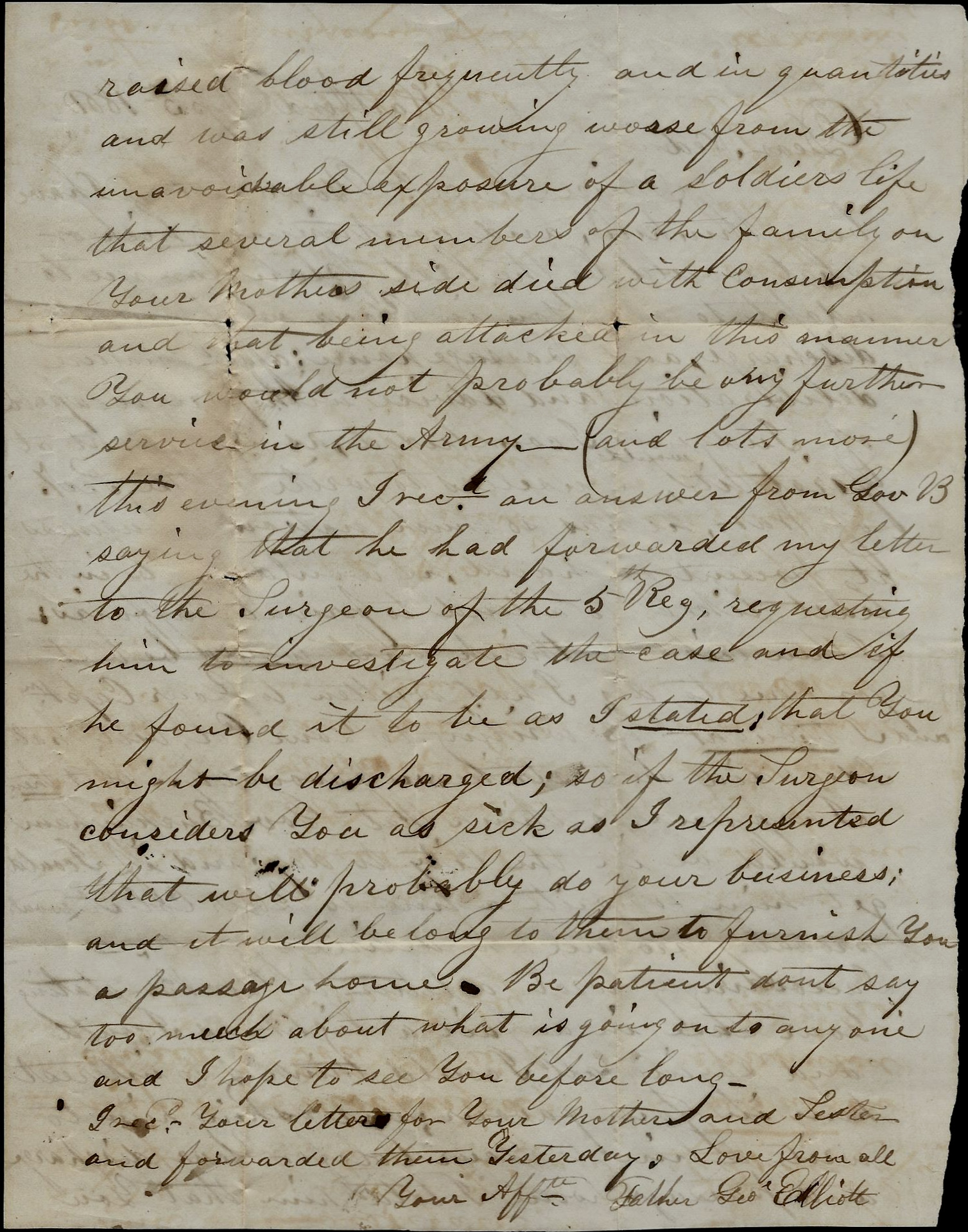

Letter 5

Hartford [Connecticut]
Septemer 10, 1861
My Dear Wife & Daughter,
Your letter enclosing Edwards came to hand this evening and although I expect to be at home on Saturday, I think that you would be glad to know that I have done for the poor boy. I hasten to inform you.
Immediately on the receipt of the first letter from Ed, that same evening I wrote to Capt. Lane telling him that I had learned from several sources of Ed’s illness, telling that from the nature of his complaint that it was altogether improbable that he would be of any further service in the Army, telling him that several in the family on his mother’s side had died of consumption and requesting him to use his influence with his Colonel to obtain a discharge for him and mailed the letter the next morning.
On the same evening I wrote to the Hon. Dwight Loomis but happening to remember that Congress had adjourned and that he probably would not be at Washington, I did not send it. I have since learned that I was right. He was not there.
As to writing to the Secretary of War as Ed wanted me tto, I was satisfied that it would be entirely useless for several reasons, and I found that several intelligent persons whom I consulted agreed with me in that opinion. Well, what could I do? Habeas Corpus? No go! In the time of war, if it would be of any benefit (which was doubtful at least) would be too slow to be of any use.
Well that constantly recurring question again presented itself, what could I do that would be likely to be of any benefit? I took up a daily paper—my mind still on the subject—when the first thing that took my attention was a notice that the remains of Gen. Lyon were expected in Hartford the next day. I thought if that be the case, Gov. Buckingham will be here to attend the obsequies. He is called a humane feeling man—a philanthropist. My course was at once obvious to me. I at once took my pen and wrote a letter to Gov. B. stating in a respectable manner my reasons and then soliciting his assistance by his writing a request to the Colonel of the 5th Regiment for Ed’s discharge and a passage home. I directed it to him at the Allyn House where he generally puts up and two days after, on the first day that he was in the city, I received an answer from his Executive Secretary saying that Gov. B. desired him to acknowledge the receipt of my letter which his Excellency had forwarded on to the Surgeon of the 5th Regt. requesting him to investigate the case and if found to accord with my statements in the letter, that he might be discharged.
It appears to me this is the most efficient and judicious course I could have pursued and there I must let it rest for the present and I have but very little doubt that it will produce the desired effect sooner than I could have done it in any other way.
Love to all, — George Elliott
I have copy of my letter to Gov. B which I will bring home with me & his answer and Ned’s letter. Good night. — G. E.

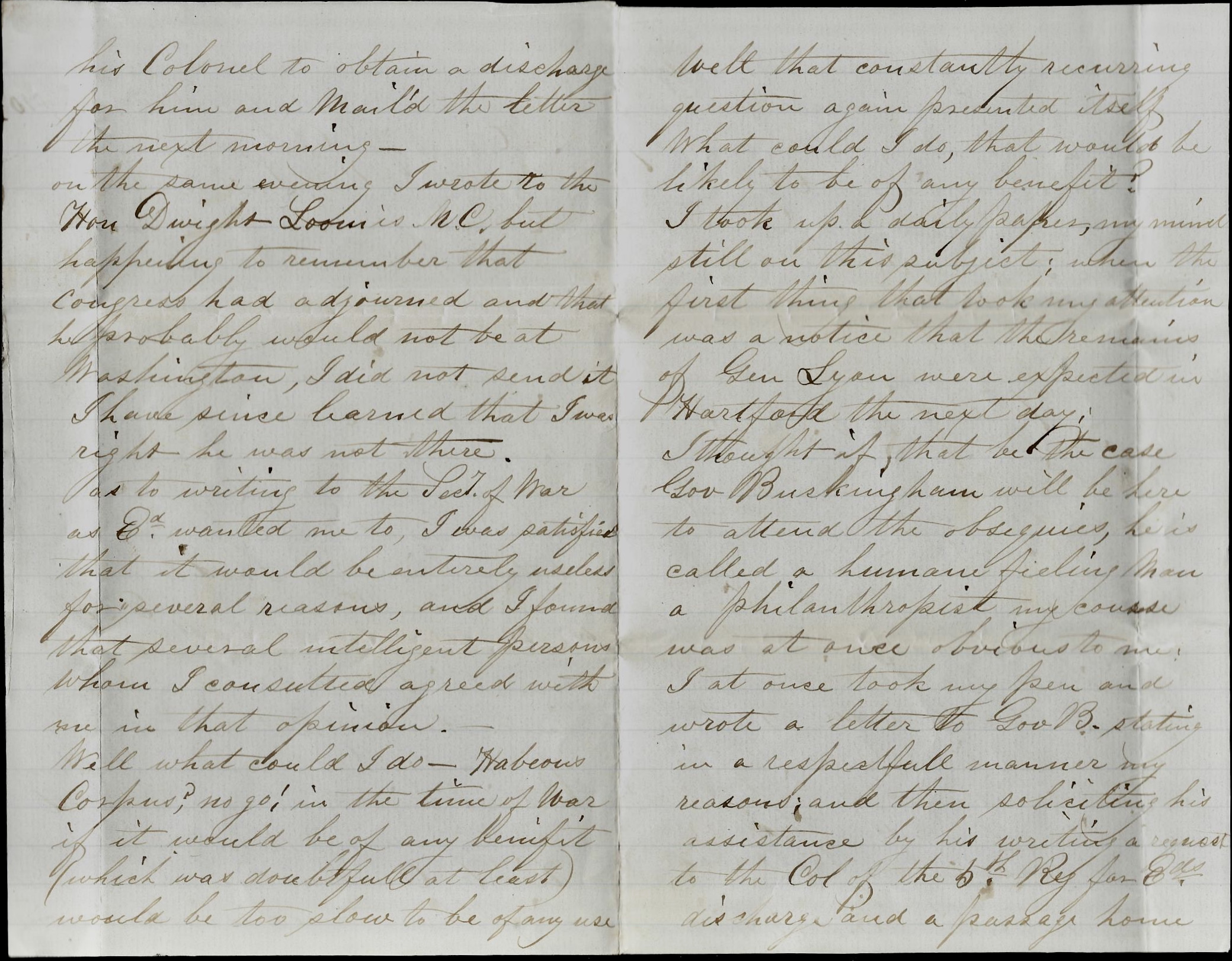
Letter 6

Camp Ellsworth
5th Regt. Conn. Vols.
Darnestown, Maryland
September 11, 1861
George Elliott, Esq.
Dear Sir,
Your letter of the 2nd inst. addressing His Excellency, Gov. Buckingham, concerning the health of your son, Edward A. Elliott, Co. D, 5th Regt., has been forwarded to me with the request that I should examine into the case for your benefit. I have carefully examined your son, and am convinced that there is no immediate cause for alarm concerning his health & comfort. At no time has he exhibited symptoms of “hemorrhage from the lungs,” and you have certainly been misinformed in anything stating to the contrary. He has never been “quite sick,” nor is he “growing worse.” On the contrary, he is at the present time able to do duty every day, has a good fare, & as comfortable quarters as any soldier can have—and excepting homesickness, I think there has been little the matter with him.
He, in common with many others, has been frequently excused from duty in consequence of slight indisposition, caused more by discontentment than by physical ailments. He is evidently not very robust & I have been disposed to relieve him from all duties that would induce fatigue. In marches, he has not been required to carry his knapsack & sometimes not even his gun. His appetite is good & I can see no reason for giving a certificate of disability wherewith to procure a discharge from the service.
If however, at any future time he should show symptoms of consumption, which disease you say he is predisposed to by inheritance, or if any other disease or accident should disable or disqualify him for service, I will endeavor to lose no time in procuring for him an honorable discharge. In the meantime, he will be faithfully cared for by the Medical Staff of this regiment, whenever our services may be required.
Hoping there may be no further real cause for parental anxiety, but that your son mat return to you in good health & strength, I am very truly yours, — J. B. Lewis, Surgeon, 5th Regt., C. V.


Letter 7

[Letter from Connecticut Governor William Alfred Buckingham to George Elliott]

State of Connecticut
Executive Department
Hartford, [Connecticut]
September 21, 1861
Sir,
Inclosed find a letter from the Surgeon of the 5th Regt. respecting your son. I am happy to hear that he is doing so well. Yours truly, — W. A. Buckingham
George Elliott, Esq.

Letter 8
[Written by 15 year-old Euphrasia Elliott to her brother 17 year-old brother Edward in the 5th Connecticut Infantry.]
Manchester, [Connecticut]
September 27, 1861
My Dear Brother,
I take my pen in hand this evening to write you a few words. Well, Edward, how are you? and how are you getting along? It is not very pleasant out of doors tonight. The wind blows quite hard and it reminds me of the night last fall when the old oak lost a limb. Twas very windy you know and we did not know but the south side of our house would blow in. Do you ever see James or George now-a-days? I wrote to them last Sunday. How does Frank Winchester do? Charlie and I go to school together to Mr. Anthony. I expect to go to school to Dr. Webster at the District [School] this winter.
I heard today that John Slate arrived home last night and suppose it is true but have not seen him. I went out to Oreanna Keeny’s school last week. She seems to have a pretty good school. I wrote to Mary last night. I received a letter from Miss Loomis one day this week. She writes that she expects to come down next week but does not intend to stay.
Perhaps you are lonesome sometimes and wish yourself at home; but do not be discouraged for we may meet again. Prove yourself a true soldier and do your duty—not only do it, but also do it well. Mother says men have been imprisoned ten years and then regained their liberty. Keep up good spirits. The war may not last as long as it has been anticipated. She says she is glad to hear that your health is improving.
We heard from Mary the other day. She does not seem to grow smart very fast. Sarah had not returned home but Frances Gleason is down there and Mary seems well pleased with her. I hope you will please to excuse me from writing any more for I am quite tired as I think you will own that my writing gives evidence of my either being tired, drunk, or crazy. Please write me soon. Remember me as ever your sister, — Euphrasia
P. S. Put your trust in Him who is able to keep you for he has said, “Cast thy burden upon me and I will sustain thee.” If you are weak, He is strong and is ever willing to help those that ask Him in humbleness and confidence. — E


Letter 9
[Copu of letter written and kept by George Elliott to Surgeon John Benjamin Lewis of the 5th Connecticut Infantry.]
Hartford [Connecticut]
September 28, 1861
Dear Sir,
I wish to acknowledge the receipt of your letter of the 11th inst. enclosed in a line from Gov. Buckingham, and thank you for the promptness and kindness with which you attended to the case of my son Edward and in promising your personal care and attention to it in the future. As to that species of sickness that you speak of (home sickness) of course time is the antidote for that, but I was led to suppose that he had been “quite sick” and was “growing worse” by those who I knew to be intimately acquainted with him and whom I considered as reliable and disinterested persons.
I beg leave to subscribe myself yours truly, — George Elliott
Doct. J. B. Lewis, Surgeon, 5th Regt. Conn. Vol.
Copy to Dr. J. B. Lewis, Surgeon 5th Regt. Conn. Vol.

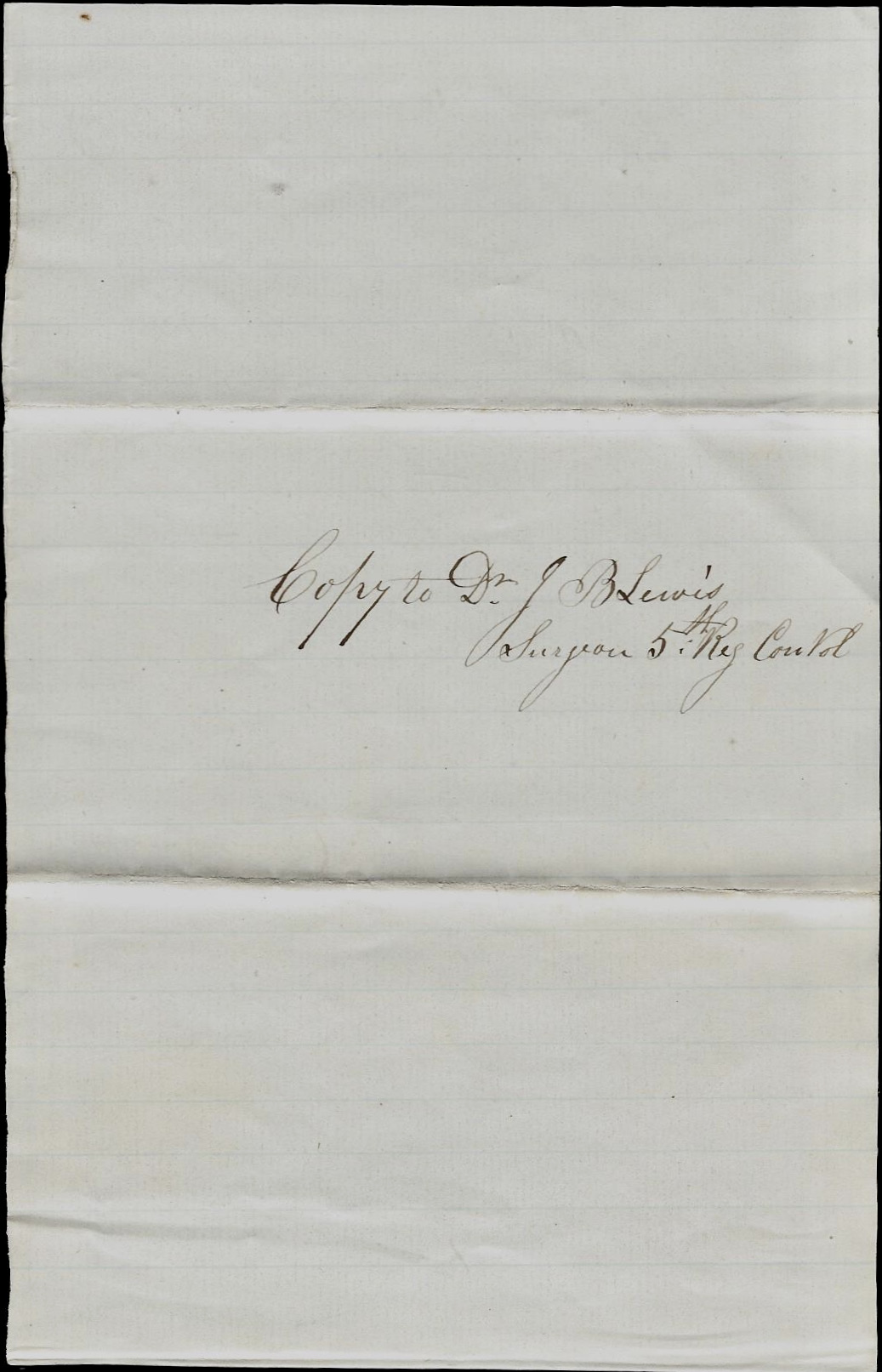
Letter 10
[Copy of letter written and kept by by George Elliott to Connecticut Governor Buckingham]
Hartford, [Connecticut]
September 28, 1861
Honored Sir,
With pleasure I embrace the earliest convenient opportunity if acknowledging the receipt of your kind favor of the 21st inst., and its enclosure of a letter from the Surgeon of the 5th Regt. C. V. I was made happier by the information of the improvement in my son’s health and the promise of the doctor’s personal supervision of his case in the future, although I am not satisfied that he has not been more indisposed than the doctor seems to believe for my information was of such a nature and from persons reliable and intimately acquainted with him that I cannot doubt his having been quite severely sick.
I wish to express the acknowledgement of my sincere gratitude for the inteest and kindness that you have manifested in this case and remain, sir, truly your obedient servant, — George Elliott
His Excellency Gov. Buckingham


Letter 11
[Written by George Elliott to his 17 year-old son Edward in the 5th Connecticut Infantry.]
Colts Armory, Hartford
September 29, 1861
Dear Edward,
Your last letter was duly received in which you requested me not to write till I saw John Slate or your other friend (don’t give your money foolishly to them) but as I have just received a letter from Doctor Lewis, Surgeon of the 5th, through the hands of Gov. Buckingham, I write to let you know something of the content and my opinion of the case.
He says that he received my letter enclosed in one from the Governor with the request that he should “examine the case for my benefit.” He states that he has “carefully examined it, and is convinced that there is no immediate cause for alarm.” He says no time has he (you) exhibited symptoms of hemorrhage of the lungs and I have certainly been misinformed in anything stating to the contrary, and excepting homesickness, he thins that there has been but little the matter. He says you are not very robust and he has been disposed to relieve you from all duties that induce much fatigue. In marches you have not been required to carry your knapsack and sometimes not even your gun. Your appetite is good and he sees no reason for giving a certificate of disability herewith to procure a discharge from service. If however, at any future time you should show symptoms of consumption or if any other disease or accident should disqualify you from service, he will endeavor to lose no time in procuring for you an honorable discharge.
The Governor has seen this statement and I suppose, there the matter must rest. As to Habeas Corpus, there is no use talking about that. It is out of my power. I can hardly earn money enough to pay my board and support the family and make small payments towards cancelling [my debts] and am working till 12 o’clock as many as 4 nights in the week so I have no money to invest in the law. And even if I could, the result would be—to say the least—very uncertain.
“But this is all your own doing and I see no other way but for you to make the best of it and serve your time out faithfully like a good soldier and receive an honorable discharge in the end with the reward which you will have honorably earned.”
—George Elliott to his son Edward in the 5th Conn. Vols., 29 Sept. 1861
But this is all your own doing and I see no other way but for you to make the best of it and serve your time out faithfully like a good soldier and receive an honorable discharge in the end with the reward which you will have honorably earned. I knew before you left, the soldiers’ lot and fare was hard. I realize it now. I sympathize with you all but cannot help it. But you have chosen an honorable course though a hard one. Somebody must meet the hardships and dangers necessary to sustain our government and as you have voluntarily chosen that part, do not now allow yourself to even wish to back out. You have assumed the part and duty of a man and by entering, kept out someone else. Then endeavor to fill that place and prove yourself a Man to the best of your ability.
We are all well as usual and send our love to you. See James Dilworth in your regiment and write how he stands it before you write again that I may tell his brother. Your affectionate father, — George Elliott

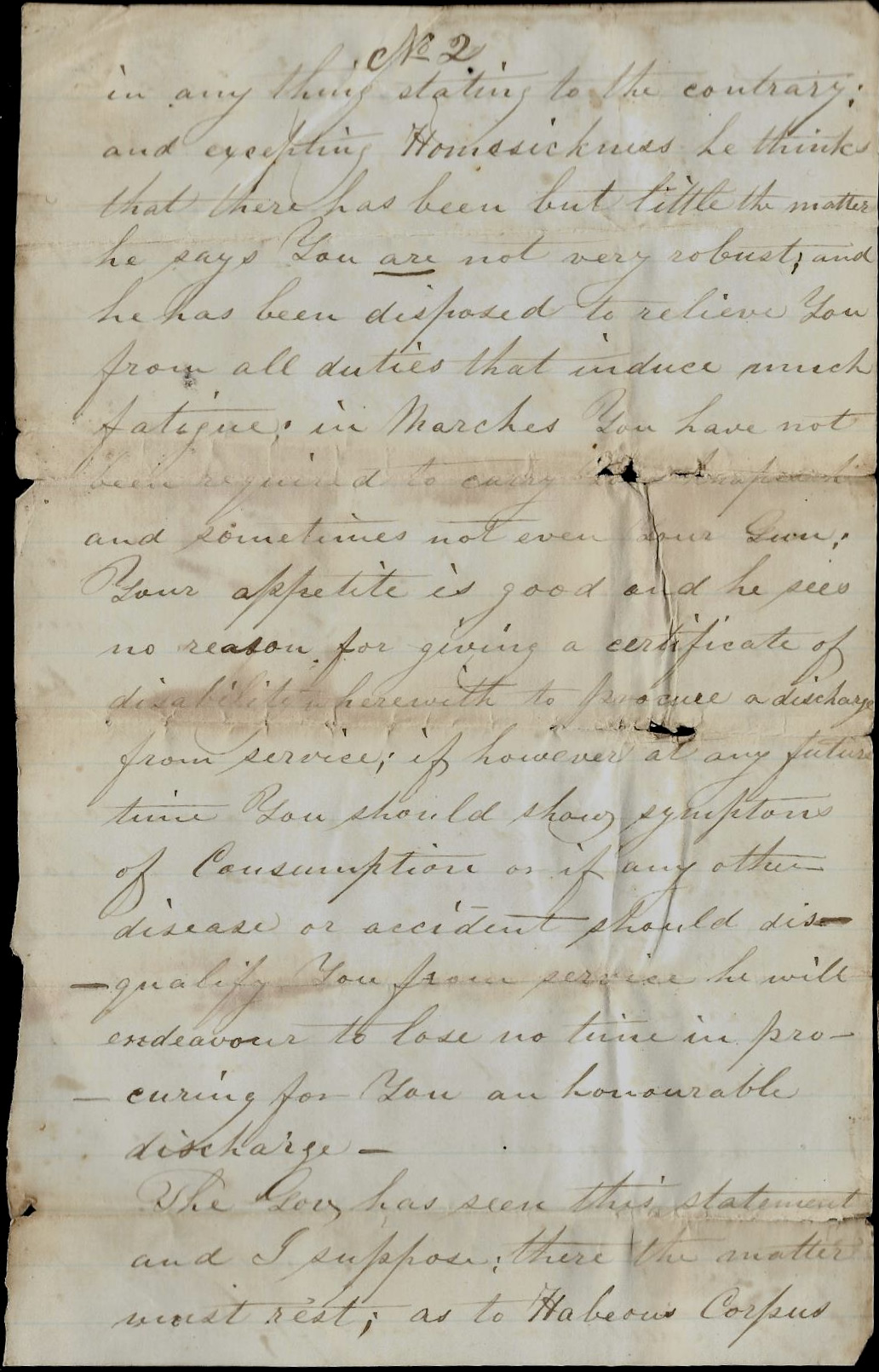


Letter 12
Camp near Muddy Branch, Maryland
October 18, 1861
Dear Father,
I received your kind note this evening and take this opportunity to answer your note immediately because my camp is a going out on picket tomorrow along the canal. You wrote to me about having to work early and late a making tools to manufacture arms to put down the Rebellion with. Well you are doing more than I am for our country because you make out something and I do not—only march from one place to another.
Since I wrote to Euphrasia on the 15th, we marched to Edward’s Ferry expecting to cross over into Virginia as all of the boys hoped but after marching 4 miles Monday night and Tuesday at [?] I was eager for the intended battle as anyone could be after being up marching all night in the rain without much to eat. Tuesday evening or next day after our march at dusk or about time for our coffee, we were ordered to [?] march for the river. Well we didn’t march only half of a mile when we marched around back. I think the march was done intended to cross when we started but after we got there the Maj. knew all the while we should not cross the river and only marched us down as a feint. We remained on down the tow path as far as Seneca Mills or Muddy Branch.
I ought to have told you my only company was on picket. I had a letter from James on the 17th. Both he and George was well. Write soon. Direct the same as before.

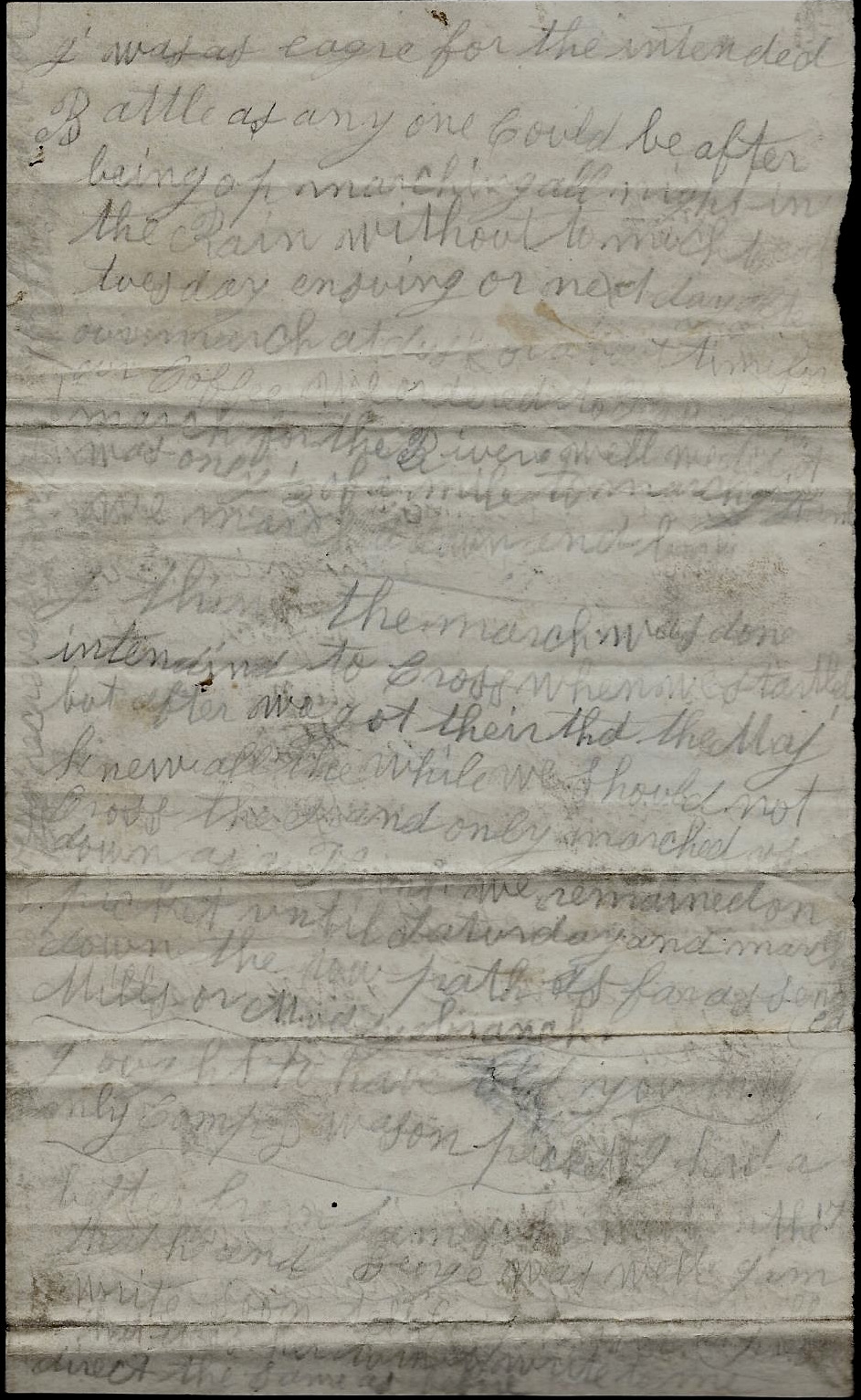
Letter 13
Camp near Muddy Branch, Maryland
November 13, 1861
Dear Father,
I take this opportunity to answer your kind letter of the 5th inst. I should have answered your letter sooner only that I had not any postage stamps for to mail it with. But as soon as I could make a raise one, I began it.
I hardly know what to write to you about. I was very glad to hear from you. You wrote me that you and Randolph Abby went out to Manchester and there you found quite a surprise party composed of three of my aunts. Well one thing is certain and that is that I should have enjoyed it greatly if I could have made a part of it. But it must be otherwise for I have a duty to do and with God’s help, I will do it. Well, you also told me of the loss of my uncle John Cutler. Well, I was considerable surprised at out not having heard of his death any sooner.
Well, you speak of your going to Bridesburg near Philadelphia and I hope that you will because I think that it would be pleasanter for the folks at home—that is, if you intend to stay long enough to pay for moving them down to B. You told me that the folks at home was all pretty well—that is, as well as usual/ Well, if Euphrasia has not received the two last letters which I wrote, tell her never mind them—that I will write another as soon as there is anything to write about. Tell her that I should like to be at home if it was not that my duty calling somewhere else. Tell her that I am a going to keep up a stiff upper lip until I am discharged with the rest of the 5th Regiment boys that do their duty to their country as they ought to do. Tell her that I am going to get my picture taken and shall send it home for her to take care of until I come home. Tell her that I promise to get a team to carry her down to my sister’s to see my nephew. Tell Mary that it is her turn to write to me.
Love to all the folks at home and all enquiring friends. By the way, have the folks at home ever got a book which I sent by Adams Express. In this you will find enclosed the receipt from Adams Express Co.
Write soon. Direct as before. From your affectionate, — Ed


Letter 14

Camp near Hancock, Maryland
February 11, 1862
Dear Mother,
I have just received your kind and affectionate letter just now—that is, within ten minutes—and was very glad to hear from you so soon after writing to you. It was eight days after I wrote to you.
There is very little news to write to you about. 1st, I would like to have you tell me when you heard from Leomis last. 2nd, I heard from [brother] George three or four days ago and he was pretty well at present and he wanted to know what I was willing to give to you and the rest of the family, and I will tell you just what I told him—that is, the sum and substance of what I told him is this; that I was willing to give you and the children $50 next pay day but how much longer I cannot tell for I do not think that I shall be in the Army—at any rate in this regiment—-for I am sick of this kind of staying here for it is not living to stop out here. Please to burn this up.
3rd, in one of your letters you wanted to know whether I had found my blanket yet. I found that the blanket was not put down to my name so I drew one. I must close. Love to all.
Write soon. From your affectionate son, [Edward]


